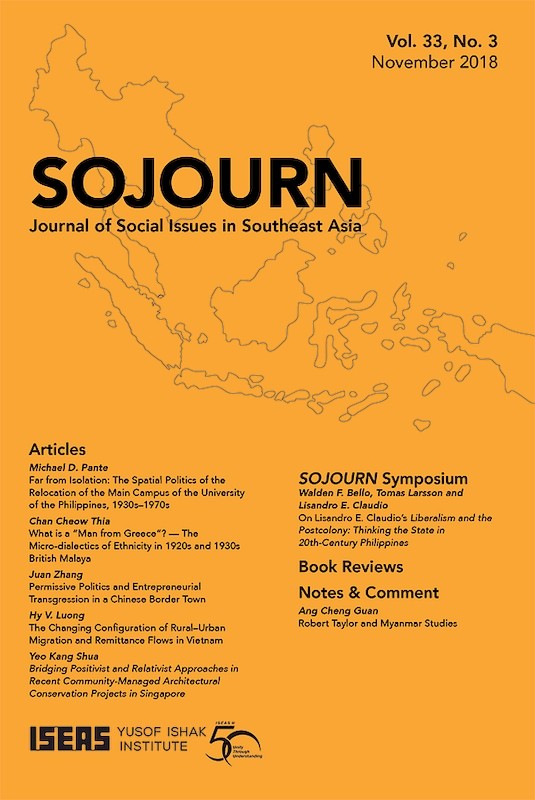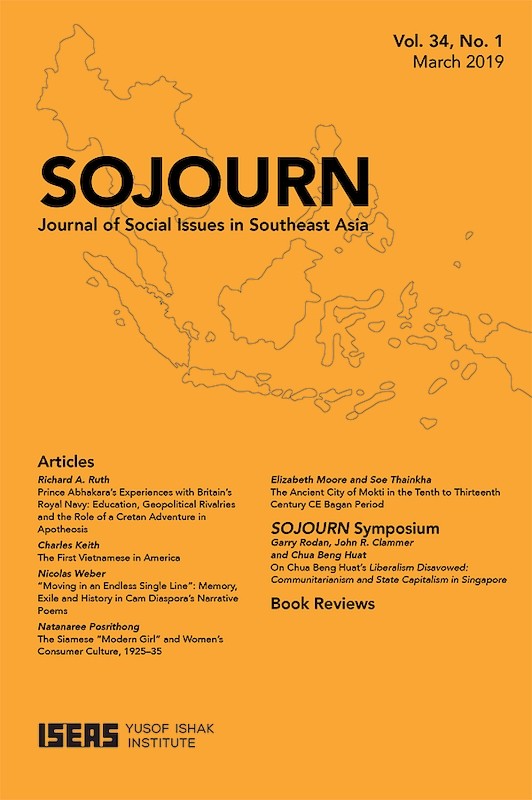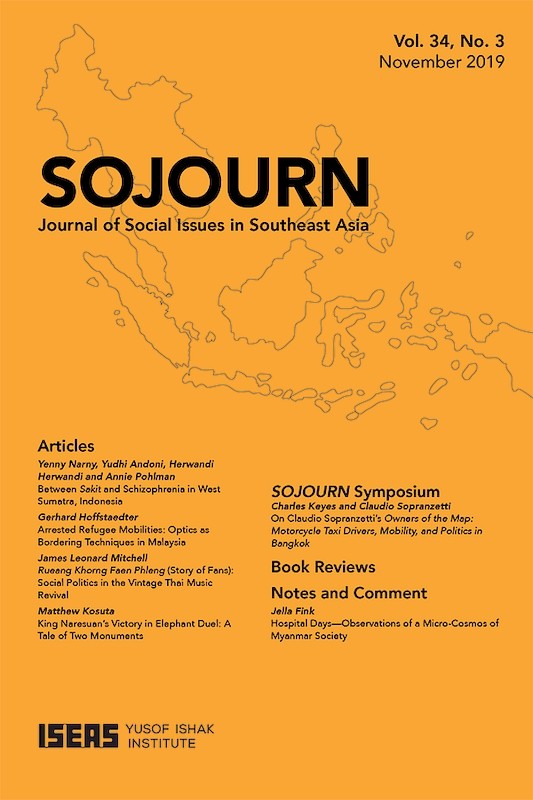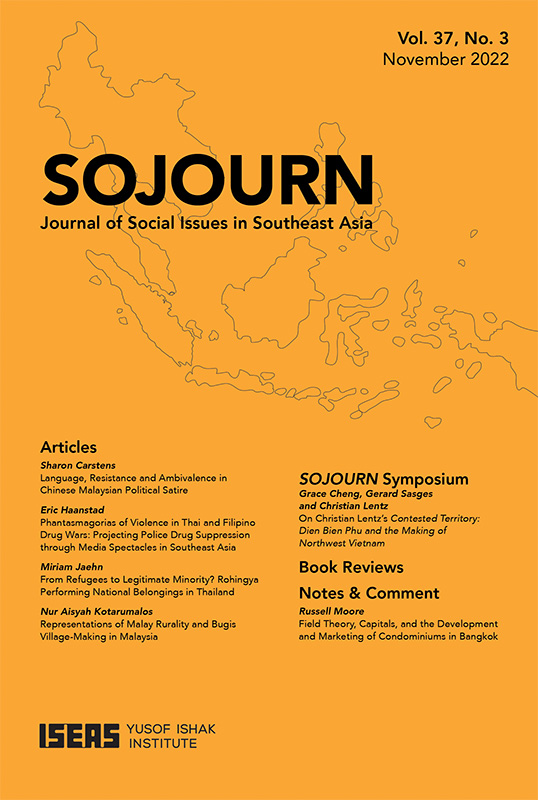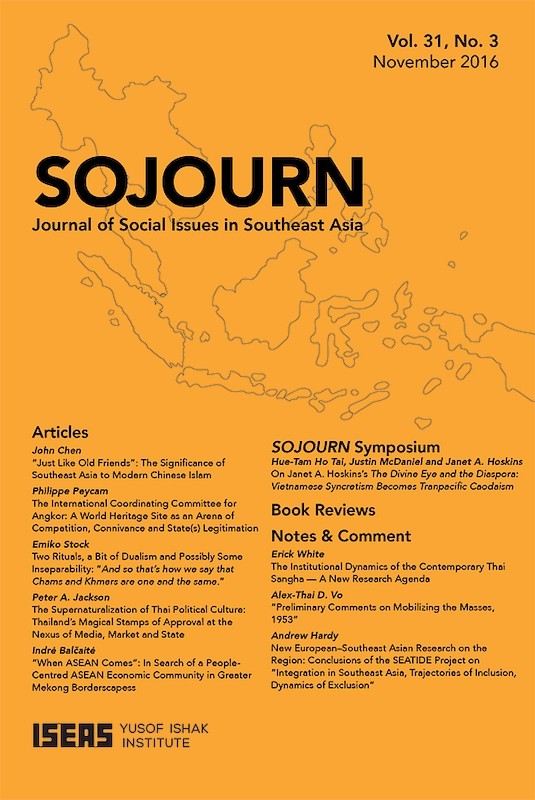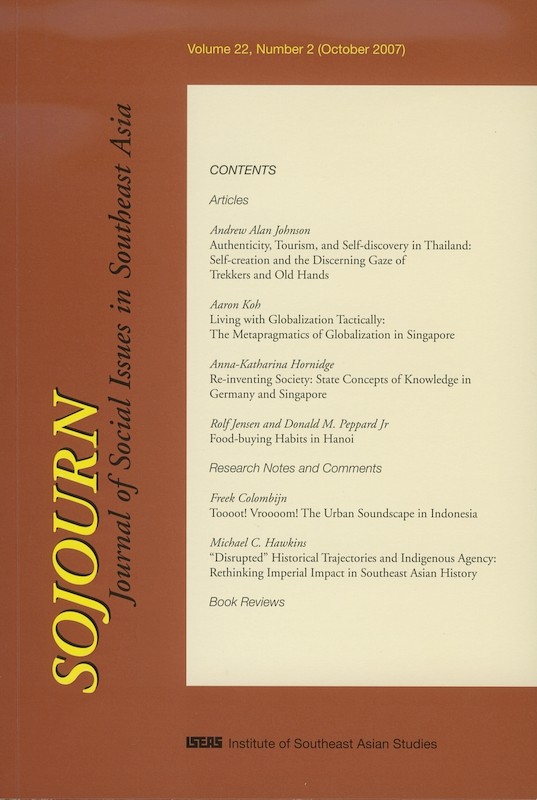SOJOURN: Journal of Social Issues in Southeast Asia Vol. 30/3 (November 2015)
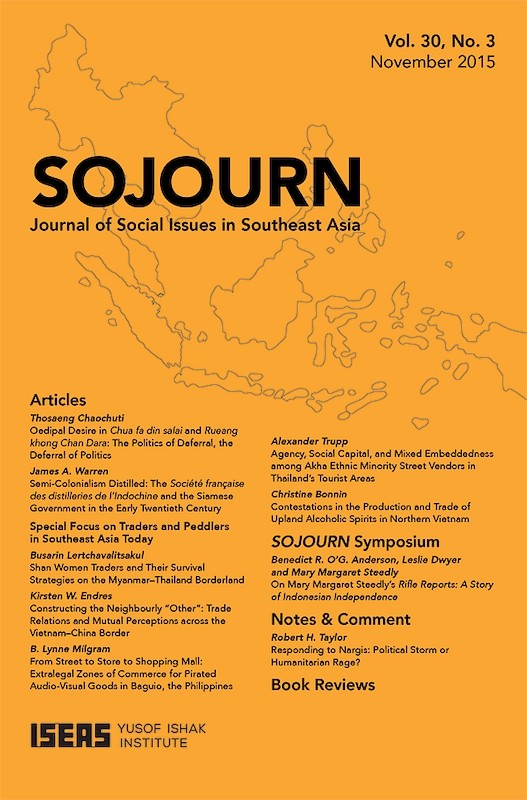
Date of publication:
November 2015
Publisher:
ISEAS – Yusof Ishak Institute
Number of pages:
344
Code:
SJ30/3
Contents
-
SOJOURN: Journal of Social Issues in Southeast Asia Vol. 30/3 (November 2015)
[Whole Publication, ISSN: 17932858] -
Preliminary pages
- ARTICLES
-
Oedipal Desire in Chua fa din salai and Rueang khong Chan Dara: The Politics of Deferral, the Deferral of Politics, by Thosaeng Chaochuti, author see abstractAmid the political turmoil that has embroiled Thailand for almost a decade, M.L. Bhandevanov Devakula adapted for the big screen two classic Thai novels that tell the stories of defiant Oedipal sons who refuse to defer their desires. By adding references to the 1932 Siamese revolution, the director links this refusal with the discourse of <i>ching suk kon ham</i> (premature action) and transforms the Oedipal tales into allegories for that political event. He is thus able to take a firm political stand by reinforcing some of the most important narratives that have been revitalized during the country’s long-running political crisis.
-
Semi-Colonialism Distilled:The Société française des distilleries de l'Indochine and the Siamese Government in the Early Twentieth Century, by James A Warren, author see abstractIn the early twentieth century, the <i>Société française des distilleries de l’Indochine</i>, principal supplier to the alcohol monopoly in French Indochina, sought to extend its operations into Siam. This led to a protracted dispute with the Siamese government over the rights that the company enjoyed under the unequal treaties that Siam had signed with the Western imperial powers in the mid-nineteenth century. After sustained pressure from the French government, the Siamese government was forced to resolve some legal ambiguities in favour of the SFDIC. This dispute thus captures the essence of Siam’s semicolonial relationship with the West.
- SPECIAL FOCUS ON TRADERS AND PEDDLERS IN SOUTHEAST ASIA TODAY
-
Shan Women Traders and Their Survival Strategies on the Myanmar–Thailand Borderland, by Busarin Lertchavalitsakul, author see abstractBetween the 1970s and the mid-1990s, the Burma–Thailand borderland witnessed an expansion of long-distance trade conducted by Shan women. This expansion occurred despite an escalation of ethnic rebellions and insurgencies on the Burmese side of the frontier, and in particular the relocation of the drug warlord Khun Sa’s garrisons to this area. Traders’ narratives illustrate their success in developing survival strategies in this politically volatile environment. The narratives highlight the traders’ ability to continue small-scale trade by cooperating with fellow traders inside Shan State and with trading partners on the Thai border. The strategies that they employed reveal the interplay of state regulations and the practices of state authorities in this borderland.
-
Constructing the Neighbourly Other: Trade Relations and Mutual Perceptions across the Vietnam–China Border, by Kirsten W Endres, author see abstractThe normalization of post-war relations in the late 1980s has transformed the Vietnam–China border from a line of demarcation between two hostile neighbours into a zone of profitable economic opportunities. At the Lào Cai central market, Vietnamese small-scale traders and Chinese citizens interact with one another on a daily basis. Their narratives reveal that processes of constructing self-identity and otherness at the Vietnam–China border are ambiguous and multivocal. They attest to historically rooted stereotypes linked to China’s claim of by face-to-face commercial transactions that challenge essentialized assumptions about the cross-border Other.
-
From Street to Store to Shopping Mall: Extralegal Zones of Commerce for Pirated Audio-Visual Goods in Baguio, the Philippines, by B Lynne Milgram, author see abstractA focus on the trade in pirated DVDs and CDs dominated by Philippine Muslim street and store vendors in Baguio, the Philippines, permits analysis of “legal/illegal” practice. Both vendors and city officials use the elasticity of “extralegality” as an urban organizing logic to their mutual advantage — rental income for the city and a livelihood for vendors. Vendors differentially combine “everyday” and “advocacy” politics to secure their livelihood, while authorities variably tolerate and penalize their trade. By troubling legal/illegal practice Philippine Muslim traders assert their voice in work arenas from which they have been largely excluded.
-
Agency, Social Capital, and Mixed Embeddedness among Akha Ethnic Minority Street Vendors in Thailand's Tourist Areas, by Alexander Adelaar, author see abstractEye-catching self-employed female Akha souvenir vendors have become part of the informal sector in Thailand that is linked to the global tourism economy. Data from nine months’ qualitative research are analysed in the framework of “mixed embeddedness” to explore the opportunities and risks with which ethnic minority street vendors in Bangkok are confronted. The role of social capital merits analysis, and Akha vendors’ practices of economic action require examination. Comprehensive assessment of ethnic minority entrepreneurs with respect to their everyday economic activities and prospects must systematically integrate individual and collective action into socio-economic and politico-institutional contexts.
-
Contestations in the Production and Trade of Upland Alcoholic Spirits in Northern Vietnam, by Christine Ngoc Ngo , author see abstractIn the uplands of Vietnam, home-distilled rice and maize spirits have long had a strong sociocultural and economic role for many ethnic minority groups. Recently, some of these products have been transformed into cultural commodities, as the Vietnamese state and other parties have — in activities often labelled development interventions — identified, invested in and branded villages specialized in their production. A case study of the trademarking of one upland village in northern Vietnam designated as specializing in alcohol production reveals emergent conflicts among groups of differently situated actors in the upland spirit commodity chain. These actors include ethnic minority producers and traders, lowland Vietnamese traders and wholesalers and the Vietnamese state. The case also illustrates the various actors’ strategies for attempting to maintain or acquire stakes in the alcohol market.
- SOJOURN SYMPOSIUM
-
Rifle Reports: A Story of Indonesian Independence, by Mary Margaret Steedly. Review essays by Benedict R. O'G. Anderson and Leslie Dwyer, with a response from Mary Margaret Steedly, by Benedict R O'G Anderson, Leslie Dwyer, Mary Margaret Steedly, authors
- BOOK REVIEWS
-
BOOK REVIEW: Migration Revolution: Philippine Nationhood and Class Relations in a Globalized Age by Filomeno V. Aguilar, by Philip F Kelly, author
-
BOOK REVIEW: Slow Anthropology: Negotiating Difference with the Iu Mien by Hjorleifur Jonsson, by Holly High, author
-
BOOK REVIEW: Vietnamese Colonial Republican: The Political Vision of Vu Trong Phung by Peter Zinoman, by Eric Jennings, author
-
BOOK REVIEW: Vietnam's Socialist Servants: Domesticity, Class, Gender, and Identity by Minh T.N. Nguyen, by Helle Rydstrom, author
-
BOOK REVIEW: Women and Sex Work in Cambodia: Blood, Sweat and Tears by Larissa Sandy, by Joanna Busza, author
-
BOOK REVIEW: The Malaysian Islamic Party PAS 1951–2013: Islamism in a Mottled Nation by Farish A. Noor, by John Funston, author
-
BOOK REVIEW: Indians in Singapore 1819–1945: Diaspora in the Colonial Port City by Rajesh Rai, by Marina Carter, author
-
BOOK REVIEW: The Future of Singapore: Population, Society and the Nature of the State by Kamaludeen Mohamed Nasir and Bryan S. Turner, by Terri-Anne Teo, author
-
BOOK REVIEW: Southeast Asian Muslims in the Era of Globalization edited by Ken Miichi and Omar Farouk, by Joel S Kahn, author
-
BOOK REVIEW: Red Stamps and Gold Stars: Fieldwork Dilemmas in Upland Southeast Asia edited by Sarah Turner, by Huong Le Thu, author
- NOTES AND COMMENT
-
Responding to Nargis: Political Storm or Humanitarian Rage?, by Robert H. Taylor, author see abstractTaking approximately 140,000 lives, Cyclone Nargis hit the Ayeyawady Delta of Myanmar in May 2008, as the government was preparing to hold a referendum to confirm a new constitution for the country. The referendum was part of the military’s seven-step road map to a new constitutional order. Given the political significance of the referendum, the government’s post-cyclone relief efforts were ignored, and an international campaign was launched to provide a means of intruding into the political process under way. The government successfully fended off those efforts, thanks in part to assistance from ASEAN and other Asian states and much to the frustration of the United States and other Western governments. This comment was originally prepared in 2009 as a paper presented to a workshop on the response to Cyclone Nargis held at the Institute of Southeast Asian Studies.

